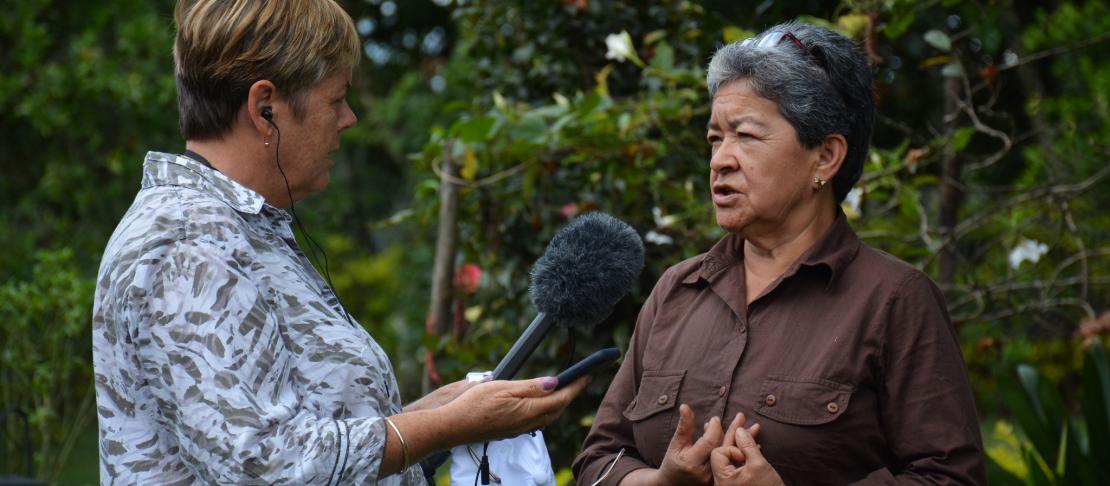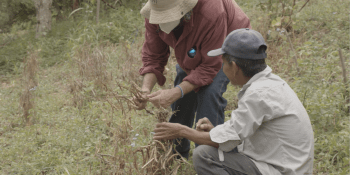Media advisory | Navigating coverage of climate change and agriculture: CCAFS and partners host webinars for journalists this February

Agriculture is both a driver and a casualty of climate change. The Intergovernmental Panel on Climate Change (IPCC) estimates that 10–12 percent of human-produced greenhouse gas emissions come from agricultural activities. These emissions, in turn, contribute to making agricultural output less reliable due to higher temperatures, droughts and floods.
As human populations increase and demand for food rises, solving the interwoven challenges of agriculture, food production and climate change is one of humanity’s greatest priorities.
It is one of the biggest stories of our time. But it is sometimes a complicated story to tell.
During a series of webinars on climate change and agriculture, a global team of scientific experts will discuss tools journalists can use to help better convey how climate change and agriculture are intricately linked. The series will cover some of the latest advances helping agriculture become more resilient, more productive and less of a burden on the environment. Journalists who are experts on reporting on climate issues will moderate these discussions.
The series will feature scientists from the International Center for Tropical Agriculture (CIAT) and the CGIAR Research Program on Climate Change, Agriculture and Food Security (CCAFS). Journalists from Internews’ Earth Journalism Network will moderate the discussions, with facilitation and coordination provided by the Global Forum for Media Development.
The three webinars will focus on three regions where CIAT and CCAFS conduct most of their research: Latin America and the Caribbean, Africa and Asia.
Latin America and the Caribbean
Scheduled to coincide with IPCC’s Lead Author Meeting at CIAT, this webinar will highlight the work on the IPCC’s upcoming Climate Change and Land report, which will be released this year. This webinar will discuss trends on deforestation in Latin America and what land-use change means to the global climate. Experts will also talk about climate-related challenges facing agriculture in Latin America, and new tools and knowledge for addressing these challenges. The expert panel will include at least one IPCC author who can discuss the report’s significance for policymakers in the region.
Date: February 12, 10 a.m. (Bogotá), 9 a.m. (Mexico City), 12 p.m. (Buenos Aires)
Language: Spanish
Moderator: Fermín Koop, Editor Claves21
Expert Panel: Ana María Loboguerrero, Head of Global Policy Research, CCAFS, Cali, Colombia
Louis Verchot, IPCC author and Landscape Restoration Theme Leader at CIAT, Cali, Colombia
Register here.
Africa
African countries are taking ambitious action towards sustainably resolving the climate crisis. This was evident at COP24, where the rulebook for the Paris Agreement was agreed upon by the world’s climate negotiators. The rulebook addresses critical issues for the continent, including greenhouse gas emissions reporting and climate finance. This webinar will discuss the implications global climate talks have for African countries facing prolonged drought, heat waves, sea level rise and unpredictable rainfall, and help journalists to better understand how to report on these issues.
Date: February 13, 11:30 a.m. (Nairobi), 9:30 a.m. (Abuja), 10:30 a.m. (Johannesburg)
Moderator: David Akana, Managing Editor, InfoCongo
Language: English
Expert panel: Solomon Dawit, East Africa Regional Program Leader, CCAFS, Nairobi, Kenya
Evan Girvetz, Senior Scientist at CIAT, Nairobi, Kenya
Register here.
Asia
Modifying the way we do agriculture is a global priority, and Asia, with nearly 60 percent of the world’s population, must play a leading role in agricultural transformation. This webinar will lay out some of the main issues with our current agriculture system and discuss potential solutions from the agricultural science perspective. Climate-Smart Agriculture systems, which seek to increase productivity and reduce environmental impact, will be one of the topics discussed. Experts will also discuss the main takeaways for agriculture in Asia from the most recent United Nations climate change conference.
Date: February 19, 3 p.m. (Hanoi, Bangkok, Jakarta), 1:30 p.m. (New Delhi), 1 p.m. (Karachi, Islamabad), 4 p.m. (Manila), 1:45 p.m. (Kathmandu)
Moderator: Ramesh Bhushal, South Asia Content Coordinator, Internews’ Earth Journalism Network, Nepal Editor, The Third Pole
Language: English
Expert panel: Leocadio Sebastian, Southeast Asia Regional Program Leader, CCAFS, Hanoi, Vietnam
Godefroy Grosjean, Leader, Climate Policy Hub for CCAFS, Hanoi, Vietnam
Register here.


